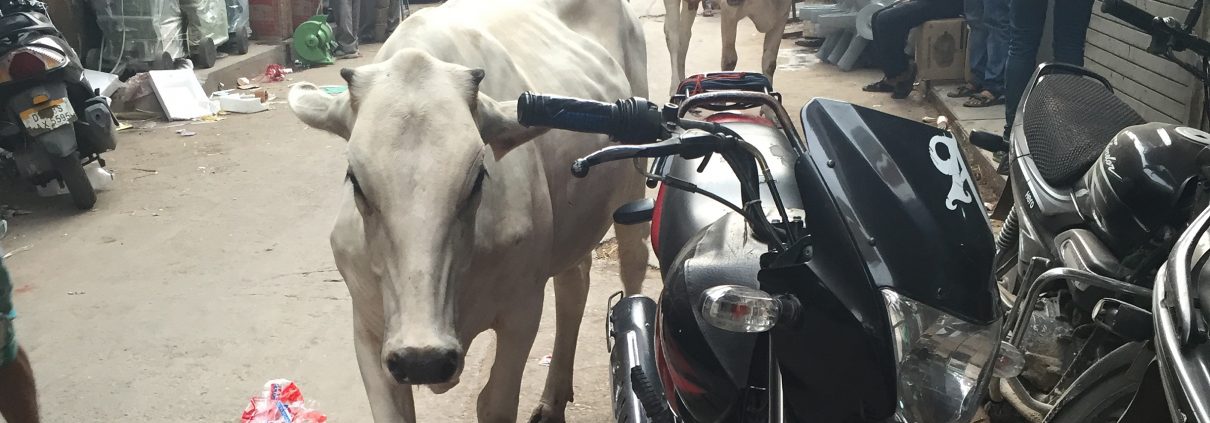Settling in and Finding My Way
By Jennifer Jiries, MSW ’17
The past few weeks have flown by so quickly so that it hardly seems possible that I am more than half way through my time in Delhi. When I first arrived the weeks stretched out before me seeming endless, giving me the sense that I had plenty of time to fully immerse myself in the work at both agencies. That was clearly wishful thinking on my part. I have definitely settled into my new home these past few weeks. I have learned to navigate the metro and I have even begun to find my way around without having to rely on GPS or others. And for the most part I am used to all the stares and looks I get everywhere I go. I have never felt more visible in my life than I do here. However, I have not grown accustomed to seeing large numbers of people living in any place they can find. I am not accustomed to the difference between where I am living in New Delhi and the conditions on G.B. Road and the more than 70 brothels located in such a small space. Each day as I leave Old Delhi and head to New Delhi, I am struck by the disparity between where I live here, both here and in America, and where I am working. And the disparity is not just about where I am living versus where the clients are living. Sometimes the hardest part to accept is how much opportunity I have had in America and how limited opportunities are here, even for those with some level of access and resources. Fortunately both IHBAS and Kat-Katha work hard to provide access and resources to everyone they can and they keep trying no matter what challenges they face. While I have not grown accustomed to the level of poverty here, I have begun to find ways to not let that overwhelm me as I go about trying to dive into the work. Compassionately compartmentalize is the best way to describe it, so that I can show up every day and engage with the clients and the work to the best of my ability.
At IHBAS I am in an observation role. They have a multidisciplinary team that works with every client, both inpatient and outpatient. I knew that coming to IHBAS would mean being in an observatory role during my time there, but I was not aware of how open the staff and patients would be during that process. Every patient and family session I was able to join were welcoming and happy to have me there, some patients even wanted to speak in English in order to better include me. I have been able to participate with the psychiatric team in their Child and Adolescent Clinics and to observe family sessions from the Drug Addiction Clinic led by a Psychiatric Social Worker. I have also been able to observe in the Outpatient Department for pre-admissions counseling sessions. Every week I have also been part of IHBAS’ Grand Rounds with lead staff from each department (Psychiatry, Psychology, and Psychiatric Social Work) and post-graduate psychiatric students as they review select cases. The discussions revolve around not only discussing the case presentations, but also challenging the students to discuss larger therapeutic concepts and how to effectively apply them for the benefit of the patients. During one of the first Grand Rounds I attended, a patient interrupted the meeting. Instead of making her leave the Director of IHBAS invited her to join the meeting and even answered her questions. He never lost patience with her or made her feel unwelcome. Later that day the hospital held an Eid celebration where staff and patients mingled together so well that there was no demarcation between them. Everyone was celebrating and everyone was treated like equals with something valuable to offer the world around them.
During my time at Kat-Katha, I have grown attached to the children more than I expected. These kids who live in brothels in unimaginable circumstances, yet they come to the school each day eager to engage, grow, and contribute. Kat-Katha works hard to create a family environment and to help however they can in order to offer the kids and the women of G.B. Road, a light at the end of the tunnel and a chance to find a way out of the brothels. The organization is only in its third year and continues to grow slowly, but surely. They are currently in a transitional period now, figuring out how to get more funding in order to grow and build programs that will best serve the women, also called didi’s (Hindi for sister). When I first started there was talk of assisting with the English classes, however the summer break started and the kids were not interested in more classes. They wanted to dance, play, and try to avoid the stifling heat. Many of them left for a few weeks to visit family. While they were gone, the staff and volunteers took a few weeks to regroup and plan some strategy for moving forward. I was excited to utilize my skills in program development and management in order to help with this process. Kat-Katha is primarily volunteer driven, so there is often a struggle to maintain a schedule, structure, and consistency, however they keep pushing forward in their commitment to always provide whatever is needed. The work is often two steps forward, three steps back, a clear example of planting seeds and having the patience to let them grow even if you do not always get to see the results of your efforts.
I knew before coming that not speaking Hindi would be a barrier, however I was not prepared for how willing the patients of IHBAS and the didi’s and children of Kat-Katha would be to let me in. I was afraid that they would find me intrusive or that I would be a burden to staff trying to do their job. Instead we all seem to have found a way to not only work together, but to also connect across whatever separates us and share with each other.
Here are some photos from my last few weeks:













